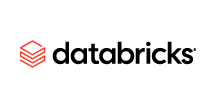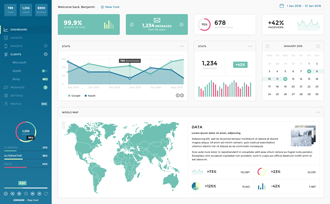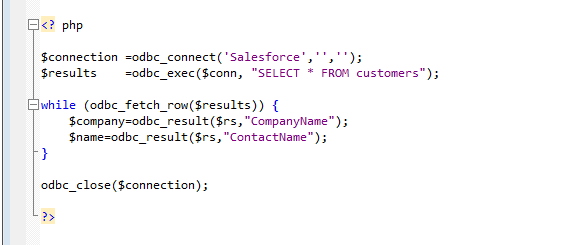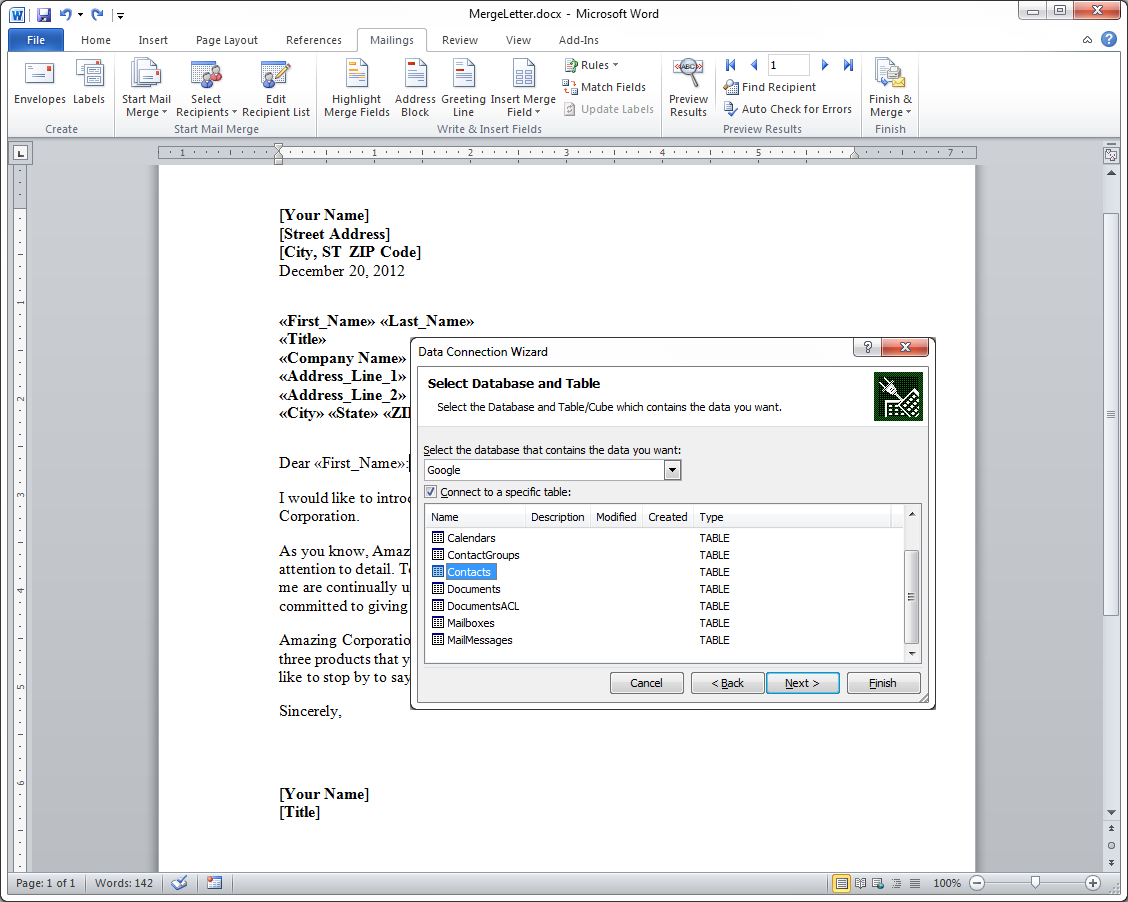Discover how a bimodal integration strategy can address the major data management challenges facing your organization today.
Get the Report →The Databricks ODBC Driver is a powerful tool that allows you to connect with live data from Databricks, directly from any applications that support ODBC connectivity.Access Databricks data like you would a database - read, write, and update through a standard ODBC Driver interface.
Features
- SQL access to Databricks lakehouses
- Connect to live Databricks data, for real-time data access
- Full support for data aggregation and complex JOINs in SQL queries
- Secure connectivity through modern cryptography, including TLS 1.2, SHA-256, ECC, etc.
- Seamless integration with leading BI, reporting, and ETL tools and with custom applications
Specifications
- Supports 32-bit and 64-bit applications.
- ODBC 3.8 compliant native protocol based drivers.
- Comprehensive ANSI SQL-92 support.
- Full Unicode Support - any language, any data.
- Cross-platform ODBC. Available for Windows, Linux and macOS.
Robust ODBC Access to Databricks
Full-featured and consistent SQL access to any supported data source through ODBC
-
Standards-Compliant ODBC
ODBC 3.8 compliant native protocol based drivers.
-
Unicode, 32-bit and 64-bit support
Support 32-bit and 64-bit applications and unicode ODBC APIs.
-
Cross-platform ODBC (Windows/Linux/Mac)
Available for Microsoft Windows, Unix, and Mac (macOS / OS X) platforms.
-
Certified ODBC Compatibility*
Our drivers undergo extensive testing and are certified to be compatible with leading analytics and reporting applications like Tableau, Microsoft Excel, and many more.
* Please visit our knowledge base to access how-to articles. -
Embedded Remoting Capabilities
Our exclusive Remoting feature allows hosting the ODBC connection on a server to enable connections from various clients on any platform (Java, .NET, C++, PHP, Python, etc.), using any standards based technology (ODBC, JDBC, etc.). ODBC Remoting is enabled using the popular MySQL and SQL (TDS) wire protocol server.
-
String, Date, Numeric SQL Functions
The driver includes a library of 50 plus functions that can manipulate column values into the desired result. Popular examples include Regex, JSON, and XML processing functions.
-
Collaborative Query Processing
Our drivers enhance the data source's capabilities by additional client-side processing, when needed, to enable analytic summaries of data such as SUM, AVG, MAX, MIN, etc.
-
Easily Customizable and Configurable
The data model exposed by our ODBC Drivers can easily be customized to add or remove tables/columns, change data types, etc. without requiring a new build. These customizations are supported at runtime using human-readable schema files that are easy to edit.
-
Enterprise-class Secure Connectivity
Includes standard Enterprise-class security features such as TLS/ SSL data encryption for all client-server communications.
-
Replication and Caching
Our replication and caching commands make it easy to copy data to local and cloud data stores such as Oracle, SQL Server, Google Cloud SQL, etc. The replication commands include many features that allow for intelligent incremental updates to cached data.
Enterprise-Class Remoting
MySQL/SQL Database entry points for Databricks Data
The CData ODBC drivers include powerful fully-integrated remote access capabilities that makes Databricks accessible from virtually anywhere. The drivers include the CData SQL Gateway, which can the optional ability to accept incoming SQL and MySQL client connections and service standard database requests.
With the CData SQL Gateway, users can interact with Databricks data from any client that supports SQL Server or MySQL: from Web & mobile applications, to CRM and CMS systems, BI tools like SQL Server Analysis Services, and even through popular management applications like MySQL Workbench. Access Databricks from virtually any application that can access external data. Applications that can access SQL Server or MySQL data can now connect to Databricks with this driver.
- Connect Databricks with popular BI tools like SQL Server Analysis Services.
- Enable enterprise Databricks integration through SQL Linked Server connectivity
- Includes support for the MySQL and SQL (TDS) remote access protocols, with advanced wire-protocol SSL security - industry standards for remote database connectivity.
- Easily connect to Databricks from code (PHP, Python, Ruby, Objective-C, etc.) using one of the standard client libraries for accessing SQL/MySQL.
- * Available exclusively in ODBC Server Licenses.
learn more
Frequently Asked Databricks ODBC Driver Questions
Learn more about Databricks ODBC drivers for data and analytics integration
Does Databricks support ODBC?
Not natively. However, CData offers an ODBC driver for Databricks that allows you to connect to Databricks data from any ODBC-compliant application, just like you would access a traditional database. This can be useful for tasks like:
- Accessing Databricks from applications: Connect to Databricks data in popular tools and applications including Microsoft Excel, Tableau, Power BI, and many others.
- Real-time data: You can work with live Databricks data within these applications, enabling tasks like reporting and analysis.
- Connecting systems: Build data integrations between Databricks and other systems.
The Databricks ODBC driver is an ODBC 3.8 compliant native protocol-based driver with comprehensive ANSI SQL-92 support. This means that virtually any application that can connect to data via ODBC, can use the CData ODBC driver for real-time integration. Download a fully functional free trial of the Databricks ODBC driver today to get started.
Is there an ODBC driver for Databricks?
Yes, the CData ODBC driver for Databricks provides universal ODBC data connectivity for Databricks. The Databricks ODBC driver offers a simple SQL-based layer of abstraction that simplifies real-time data access for users and applications, enabling them to communicate with Databricks using a standardized set of functions. Virtually any application on any platform (including Windows, macOS, or *nix) can use the CData ODBC driver for real-time integration.
How do I connect to Databricks via ODBC?
Connectivity to Databricks via ODBC is easy. First, download and install the Databricks ODBC driver. The download page includes separate installers for Windows, macOS, and Unix, so please select the Databricks ODBC driver that matches the platform where you intend to use the driver.
Once the installation is complete, navigate to the ODBC driver documentation page. Here, you'll find a wealth of information about the installed driver. The step-by-step instructions for creating a DSN and using it to connect to Databricks via ODBC are just the beginning. The documentation also provides extensive configuration details for using the Databricks ODBC driver with all your favorite applications and development tools, ensuring you have all the support you need.
Where can I download an ODBC driver for Databricks?
All of the CData ODBC drivers, including the Databricks ODBC driver are available for download online. To get started, download a fully functional free trial of the Databricks ODBC driver today.
How do I install an ODBC driver for Databricks?
To install the Databricks driver, simply download one of the Databricks ODBC driver installers available online. The download page includes separate Windows, macOS, and Unix installers, so please select the Databricks ODBC driver that matches the platform where you intend to use the driver. The installers are comprehensive setup utilities that will install all the components required to use the Databricks ODBC driver on your system.
Is the Databricks ODBC driver 32-bit or 64-bit?
The Databricks ODBC driver is available in both 32-bit and 64-bit binaries. The Databricks driver installer will allow you to install both options, and you can select the ODBC driver binary that is appropriate for the system where you intend to use the driver.
Does pyODBC work with Databricks?
Absolutely. The Databricks ODBC driver seamlessly supports pyODBC connectivity. For example, check out this article on our online knowledgebase that demonstrates how you can connect to Databricks from PyCharm using pyODBC and the Databricks ODBC driver.
However, besides ODBC support, we also provide native Python data connectivity for Databricks. To learn more, check out the Databricks Python Connector online.












